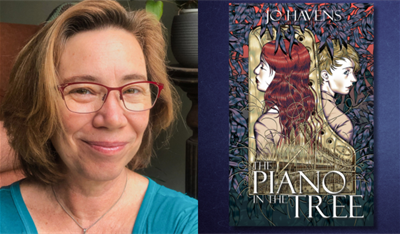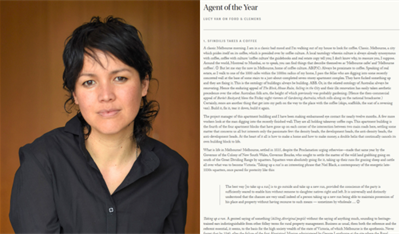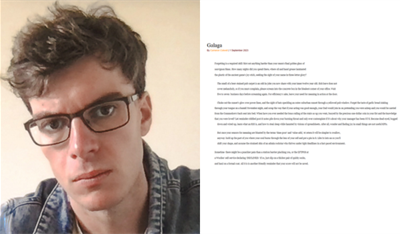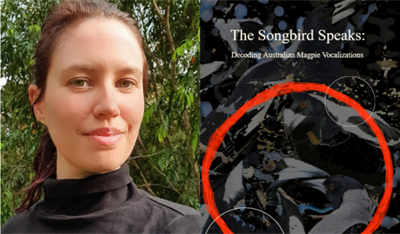2024 Winners
Fiction

The Piano in the Tree by Jo Havens, as published by Thirteen Books
“A sweeping tale of love, loss and second-chances,
The Piano in the Tree is a story that takes readers on a journey from a quiet rural farm on the south coast of New South Wales to the dizzying heights of the international symphonic scene and back again. Poignant and beautifully written, Jo Havens has written a captivating tale about grief and trauma occasioned by lost love and the road to healing through music.
Exploring the horrors of war, the ongoing effects of trauma and how love can conquer all, The Piano in the Tree is a truly worthy winner of the fiction category for the 2024 DLA.” – Claudine Tinellis
About the Author
Jo Havens writes sapphic romance under three author names and wishes she had more time. In past lives, Jo has been a librarian, a braille transcriber, an audio engineer and a backup singer for an Elvis impersonator.
In her lesbian romance novels, Jo’s characters struggle with their shortcomings, deal with the trials of life and, ultimately, listen to their hearts. Love always wins. Under another author name, her characters are assassins so ruthless Jason Bourne would take up knitting.
Jo lives in the Southern Highlands of NSW with her daughter and three cats named Howl, Popcorn and Olivia Coleman. Her historical romance, Once in Berlin, won the 2022 Golden Crown Literary Society Award for best historical romance.
Non-Fiction

Agent of the Year by Lucy Van, as published in Liminal Magazine
Lucy Van’s ‘Agent of the Year’ is a structure of multi-level brilliance—engaged book review, incisive cultural commentary, and poetically executed historical analysis all in one. The core around which Van builds is Ford and Clemens’ scholarly study of colonial-era poet and judge Barron Field, which examines the links between the poetry he wrote and his landmark articulation of terra nullius as the basis for colonising the land.
To this, Van adds rooms, extra wings, digs a basement, attaches a turret—in the service of bringing to light the full monstrosity of the house Australia has built. Turns out the poetics of terra nullius and its effects—killing and forgetting Aboriginal people—are still at work today, underpinning contemporary Australian society’s obsession with real estate and renovation and ‘home’” - Tiffany Tsao
About the Author
Lucy Van is an Asian-Australian poet, lecturer, and researcher. She is a recipient of the Lockie Fellowship(University of Melbourne, 2024), the Overland Malcolm Robertson Foundation Residency (2019), and the Melbourne Research Fellowship (University of Melbourne, 2018). Her poetry collection, The Open (Cordite, 2021), was longlisted for the Stella Prize, shortlisted for the Mary Gilmore Award, and highly commended by the Anne ElderAward. She is currently researching the poetics of Australian real estate for a new book of essays, supported by the Lockie Fellowship.
Poetry

Galgaga by Cameron Colwell, as published in Cordite Poetry Review
“Galaga canters out of the gate from the first line then rips full throttle through paddocks of grief, tenderness, desperation, disappointment, sadness (and an ancient video game), in a dazzling display of a tender inner life interwoven with corporate dead speak. Every line blasted me open as though I just lit the wick on a stick of dynamite and swallowed it whole. Anyone who has ever worked in the corporate world and somehow survived will feel this poem, and the required submission to corporate power, in the marrow of their bones. As I read, brilliant line after brilliant line crashed against the crumbling limestone cliff of myself––each wave eroding something of me that I didn’t want to keep anyway while simultaneously filling a void in me I didn’t even know was there. This remarkable poem is an SOS, a blinking lighthouse in the fog, an urgent salve in the first aid kit under the broken sink of your life. Galaga serves as the most non-corporate, human-centred, heart wrenching and inspiring memo ever broadcast. Consider yourself CC’d.” – Ali Whitelock
About the Author
Cameron Colwell is a writer and teacher from Naarm. His work has also appeared in Overland Journal and Voiceworks.
Digital Innovation

The Songbird Speaks by Alinta Krauth, as published in The Digital Review
“I suspended disbelief almost immediately upon activating this story. The use of technology was captivating and exciting. The idea that I was somehow able to listen to a story from another species was genuinely thrilling. The vision behind this submission was ambitious and beautiful. The presentation of the story was new and interesting albeit slightly hectic at times. This entry was also fun and genuinely delightful.
As a reader, whilst I understood what I was reading was fiction, it opened the possibility, in my mind at least, of technology being able to expand our understanding of stories and our standing of the world we share.” – Brett Osmond
About the Author
Alinta Krauth is a new media artist and researcher of digital practices from the ‘Outback’ of Australia. Much of her artistic research involves ecological themes and scientific fieldwork alongside ecology experts and wildlife rescue organisations. Her work considers how digital technologies can create rewarding sensory experiences for historically Othered audiences, most notably, her work with digital aesthetics for the enrichment of other species including dogs and flying foxes in rehabilitation. Her upcoming book The A(I)nimal Voice: More-thanhuman Artificial Intelligence in Art & Literature is currently under development.
Her recent artwork The (m)Otherhood of Meep, using machine learning AI to translate the vocalisations of flying foxes was nominated for the Ars Electronica S+T+ARTS Prize (2023) and was runner-up for the Robert Coover Award for Electronic Literature (2023). Her works have been exhibited and published globally, including in The SAGE Encyclopedia of The Internet, Electronic Book Review Journal, Social Alternatives Journal. Selected recent installations of her creative works have been seen in ZAZ10st Gallery Times Square NY, Science Gallery Detroit Detroit USA, The Glucksman Gallery Cork Ireland, HOTA Gold Coast Australia, Eidgenössische Technische Hochschule Zurich Switzerland, Gallery 3.14 Bergen Norway, Art Laboratory Berlin Berlin Germany, The Powerhouse Sydney Australia.
Readers' Choice

Punctuation as Organised Violence by Sara M. Saleh, as published in Meanjin
About the Author
Sara M Saleh is a writer, human rights law expert, organiser, and the daughter of migrants from Palestine, Egypt, and Lebanon. Her words have been showcased at exhibitions and festivals from St Andrews to Bangalore and have lit up the walls of The Rocks and the Opera House, and she has appeared alongside alongside some of the biggest names in contemporary literature and arts.
While Sara’s literary achievements as a poet, essayist, and prose writer transcend medium, genre and geography, she is most celebrated for her work co-editing the critically acclaimed anthology, Arab, Australian, Other (Picador, 2019) and for her historic win of the Australian Book Review’s 2021 Peter Porter Poetry Prize and the Overland Judith Wright Poetry Prize 2020. Her poems, short stories, and essays have been published widely in English and Arabic in Australian Poetry Journal, Overland, Meanjin, Cordite Poetry Review, Red Room, Kill Your Darlings, Rabbit Poetry Journal, SBS, and in anthologies the Sweatshop Women’s Anthology: Volume II, Racism, Making Mirrors, Solid Air, A Blade of Grass, Groundswell: The Best of Australian Poetry, Borderless: a transnational anthology of feminist poetry, and Another Australia, and she has been commissioned to write and perform for theatre, TV, and music.
Sara's debut novel SONGS FOR THE DEAD AND THE LIVING (Affirm Press, 2023) was shortlisted for the Khairallah Prize for Literature and a NSW Premier’s Literary Award, and her full-length poetry collection, THE FLIRTATION OF GIRLS (UQP, 2023) won the 2023 Anne Elder Award and was shortlisted for the 2024 ALS Gold Medal, the ALS Mary Gilmore Award.
Working within her multiple communities to seed critical change through storytelling and the arts, Sara has run writing workshops in countless classrooms, community spaces, and festivals across the country and internationally. Her latest collaborative project, Muslim Poetry Project: Retreat and Anthology, is underway. She is the recipient of the inaugural Affirm fellowship for Sweatshop writers, Neilma Sidney travel grant, Varuna writers residency, and Amant New York writers residency, among other honours and accolades.
She is based on Bidjigal land with her partner and beloved three cats and pup they affectionately named belly hooks.
2024 Shortlist
Fiction Shortlist
“This year’s entries were a delightful mix of long and short form fiction - even some micro-fiction which was just fascinating. From historical and contemporary to post-apocalyptic and futuristic, historical, crime and romance - even what I would call a reimagined folk tale - there was so much to love! Of particular note was that several of the shortlisted works dealt with historical war/conflict and the how the consequences of those events echo through time - making for compelling reading in the light of the current geo-political climate” –Claudine Tinellis
- Jo Havens, The Piano in the Tree, Thirteen Books
- EJ Delaney, Forbidden Voices, Cast of Wonders
- Nancy Cunningham, Crossing the Bridge, Escape Publishing
- Helen Hopcroft, The Nights, Spineless Wonders
- Bill Powell, While the Sun Sets, self-published
- Sean O'Leary, Coming Home, Close to the Bone Publishing
Non-Fiction Shortlist
"There are so many ways in which a nonfiction work can be and do. I found so many of the entries deeply moving, deeply interesting, and deeply insightful. A genuine thank you to all the writers who entered this year.
I was especially struck by the following works for their remarkable demonstration of spirit, stylistic intrepidity, innovative deployment of form, and/or their astonishing ability to connect the dots across memories, events, people, places, and cultural objects." –Tiffany Tsao
- Dani Netherclift, Read as a boy, Portside Review
- EJ Clarence, Dovetails, Overland
- Elias Greig, Freehold, Overland
- Lucy Van, Agent of the Year, Liminal Magazine
- James Ley, Alienation is the Philistinism of the Intellectual, Sydney Review of Books
Poetry Shortlist
“This year's submissions were bursting with poems that took great risk, poems that walked their truths on a knife’s edge, poems that made the hair on the back of my neck stand on end and poems that made me drop to my knees. The subjects ranged from devastating notes on the rental crisis, to Punctuation as Organised Violence; from poems about a school musical performance that could never have a black dido to poems where lungs blow air the shape of chandeliers. As I made my way through the poems I’d stick the short list potentials on my wall with blu-tac. The wall ended up papered with so many I could no longer see the wall. But a shortlist is meant to be a short list (the clue is in the name). I want to send deep gratitude to every poet who submitted this year––each of your poems has sketched an indelible contour on the ordnance survey map of my heart.” – Ali Whitelock
- Anna Jacobson, 23 Vignettes on the rental crisis, Island
- Natalie Damjanovich-Napoleon, Immigration Triction, Australian Book Review
- Caroline Williamson, Dido, Overland
- Cameron Colwell, Galaga, Cordite Poetry Review
- Ouyang Yu, Fragments, Kalliope X
- Koraly Dimitriadis, Yiayia Mou, SBS
- Sara M. Saleh, Punctuation as Organised Violence, Meanjin
- Coco X Huang, Three Lessons, Meanjin
- Stephanie Powell, Notes from Greenland, The Suburban Review
- Grace Hu, Soliloquy to a friend/Shake the baby, Cordite Poetry Review
- Angelita Biscotti, SORRY IM JUST A BASIC HYSTERIC!!!!!!!! a love & farewell letter to the clyde hotel on cardigan, Cordite Poetry Review
Digital Innovation Shortlist
“This year the entries largely explored topics and ideas expressed through poetic language, imagery and sound. A quality shared by each of the shortlisted submissions was an inherent sense of beauty. The sense of beauty sometimes belied the ugliness of the subject matter on display. They were provocative, interesting, ambitious and artistic, tackling contemporary issues and conversations.
The use of innovative digital technology however was restrained and subtle, some to great effect and others not quite so. The artistic and literary merit of some of the submissions was self-evident but I struggled to ascertain what was digitally innovative about the delivery and presentation of the story at times.
There was one entry whose innovative approach and ambition stood out as fresh and captivating, exciting and visionary.” – Brett Osmond
2024 Sponsor:

Bolinda/BorrowBox joined us this year as the first proud sponsor of the Woollahra Digital Literary Award. Bolinda is a world-leading audiobook and technology company. Their generous sponsorship raised the 2024 prize pool to $9,500, expanding the award's scope and impact. It also meant our Readers' Choice winner was awarded $750.